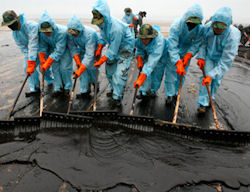Protecting Yourself
It's important that you work in a proactive manner with safety always being top priority. Be sure to do the following:

Protect yourself with good quality PPE.
- Watch for lacerations, slips, falls, and trips, especially while working on oil-slick rocks.
- Be careful walking over and handling debris that is covered with water in order to avoid the risks associated with slips, trips and falls.
- Remain current with tetanus vaccination.
- Get the Hepatitis B vaccine series if you expect to have contact with bodily fluids as a result of your duties.
- Avoid contact with stagnant water.
- Wear rubber type steel toe/shank footwear to protect your feet from injury and from oil exposure.
- Wear oil-resistant gloves when in contact with oil and oil waste
- Wear outer durable gloves when handling debris.
- Use hearing protection in noisy environments.
- Use your employer decontamination procedures before eating or drinking, using the toilet during the workday, and do a full decontamination, including a shower if available, at the end of shift.
- Wash and sanitize immediately if exposed to toxic substances.
- Know your medicines, allergies, and blood type.
- Do not stand in or come in contact with unknown liquids or substances.
- If in doubt, contact your supervisor!
Knowledge Check Choose the best answer for the question.
6-2. To make sure you're not exposed to toxic substances, what should all oil spill cleanup workers do at the end of each workshift?
You forgot to answer the question!
